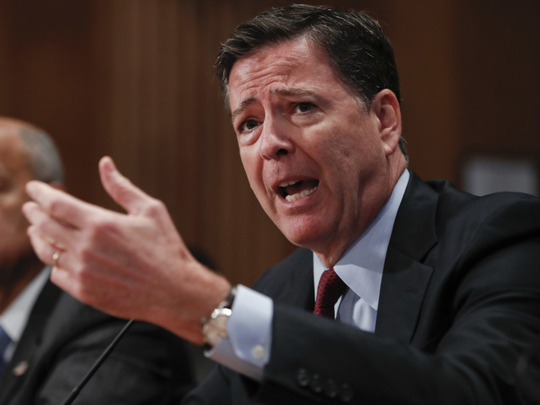
If it looks and sounds like a scandal, is it really a scandal?
The latest Clinton email flap has all the trappings. With evasive answers, shady characters and FBI investigations, there must be something going on. Right?
Rather like Saddam’s weapons of mass destruction, we may not know what’s hidden or where, but it sure looks like the Clintons have been hiding something.
Sadly this reasoning is enough for most Republican voters and a good chunk of independents. It may be enough to depress support among Democrats just at the moment the party needs to drive a high turnout among voters.
But it’s not at all clear what the FBI is talking about in terms of Clinton emails. Some reports suggest they are neither to nor from the Democratic presidential nominee Hillary Clinton herself, in which case we have just consumed a giant nothing-burger. After all, we already know that the FBI has no idea whether the emails amount to anything of any significance.
This raises the obvious question: what on earth was the FBI director thinking when he dropped his letter on Friday making it crystal clear that he knew nothing? As a rule, law enforcement agencies generally don’t publicise the fact that they are clueless.
Beyond James Comey’s extraordinary intervention in the late stages of a presidential election, his letter raises another, more familiar question about the Clintons: why do they attract pseudo-scandals with such alarming ease and frequency?
From the Clinton Foundation to the private email server, from Benghazi to Weiner, from Whitewater to Monica, the list is as long as it is utterly spurious. Whatever crumbs of wrongdoing there may be, they don’t amount to something worthy of Watergate, or even the myriad gate-suffixed scandals since. Questionable behaviour is not the same as criminal or even impeachable conduct.
Perhaps the pseudo-scandals say more about the Clinton haters than they do about the Clintons themselves. But it remains true that there is a remarkable contrast between the clouds that hang over the Clintons and those over the Obamas.
US President Barack Obama has not exactly luxuriated in eight years of hate-free politics. The haters have thrown their best at him: questioning his citizenship and his secret sympathies for Daesh (the self-proclaimed Islamic State of Iraq and the Levant). They even accused him of wanting to pull the plug on grandma.
And yet there have been no pseudo-scandals about his personal life, his friends and donors, or even open microphone moments. As a candidate he was accused of palling around with terrorists, cutting a sweetheart deal for his home, and following the lead of an anti-American preacher. Inside the White House, not so much. The integrity and self-discipline over the last eight years has almost driven the scandal-mongers out of business.
All that’s left are the obvious problems posed by a radical extremist from Kenya looking to foment a socialist revolution from the Oval Office. Given that he has only two months left in the White House, Obama needs to speed up his secret plans or else he’ll turn into an even greater disappointment to the right-wing nuts.
The good news for the scandal-mongers is the next Clinton administration appears to be just around the corner. House Republicans are already prepping their subpoenas in case they can launch another several dozen investigations into the newly-elected President Clinton.
In that context, it doesn’t much matter whether the FBI’s Clinton emails amount to anything more than political gossip. The Hunting of Hillary has only just begun.
What does matter is the impact on voters in these final frenetic days of the 2016 election. Recent polling suggests that most voters have already made up their minds about whether Clinton is honest and trustworthy: they don’t believe her. To be sure, they also think the same about Donald Trump, albeit in slightly lower numbers.
But those poll numbers mean that the email pseudo-scandal is unlikely to change anyone’s mind about the candidate. In the same way, it’s highly unlikely that Bill Clinton’s money-making schemes at the Clinton Foundation will affect his wife’s honesty numbers.
For many voters, this email story comes too late. More than 12 million votes have already been cast across the country in early voting, representing around 10 per cent of the likely total votes in this election.
In any case, the polls were already tightening, as Republicans inevitably rally to their candidate, no matter how catastrophically compromised he is with the voting demographic commonly known as “women”.
Clinton’s post-debate highs were unlikely to hold. In fact, numerous studies have shown that elections tend to end where the polls stand two weeks after the conventions, despite all the fluctuations back and forth. That suggests this election will end up as a race in the mid-single digits as a margin of victory for Clinton.
Of course we don’t know what the FBI emails may yet uncover, and we certainly don’t know what turnout will look like on election day.
But we do know that the closing days of a presidential election are anxious times. Campaign staffers are exhausted and fear failure. The media is desperate for one more fix of adrenalin, one more turn of the story to upend the likely outcome. Supporters on both sides become obsessive consumers of any snippet of information that might tip the balance.
Into this gasoline-soaked period, the FBI director just threw a burning match and walked away. But the dumpster fire was already raging in this shocking election, and the voters who find the whole scene disgusting will likely stay away.
Never mind the emails. This election was already in flames.
— The Guardian News & Media Ltd
Richard Wolffe is chief digital and marketing officer at Global Citizen, a non-profit organisation dedicated to ending extreme poverty. He is the author of Renegade: The Making of a President, Revival: The Struggle for Survival Inside the Obama White House and The Message: The Re-Selling of President Obama.









